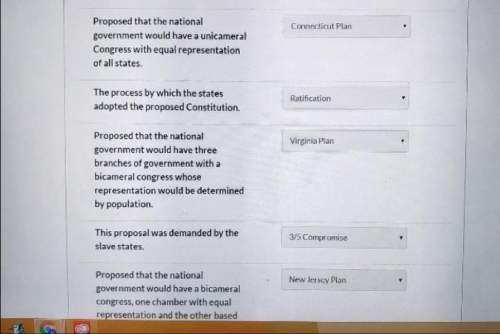
History, 18.02.2021 01:00 JvGaming2001
Excerpt taken from The Historic Rise of Old Hickory by Suzanne B. Williams
Four major candidates ran in the 1824 election, all under the "Democratic-Republican" name. One of the candidates, Andrew Jackson, was already famous. In the 1780s, he earned the right to practice law and served in various offices of the state government, including senator. He earned the nickname "Old Hickory" for his toughness as a general during the War of 1812 and First Seminole War. Jackson supported slavery and "Indian removal." This earned him support from voters in southern and frontier states. The other three candidates were John Quincy Adams of Massachusetts, Henry Clay of Kentucky, and William Crawford of Georgia.
U. S. presidents are elected through the Electoral College. The Founding Fathers worried that Americans were too spread out to learn enough about the candidates. Under the Electoral College, Americans cast their ballot for the popular vote, which chooses the electors for each state. The number of electoral votes each state equals the number of representatives and senators combined. The candidates must win an absolute majority of electoral votes to win the election.
In 1824, Andrew Jackson won the popular vote, but he did not win it in each state. Jackson and Adams both won many electoral votes. Jackson won the most with 99. However, a candidate needs an absolute majority of electoral votes to win. In 1824, Jackson needed 131 to win. When there is not majority winner, the election goes to the House of Representatives. This has only happened twice in U. S. history.
Even though he won the popular vote and many electoral votes, Andrew Jackson lost the presidency in 1824. John Quincy Adams was the Secretary of State at this time. Henry Clay was the Speaker of the House of Representatives. Henry Clay, receiving the least, was left out. However, as a leader in the House of Representatives, he had influence over the other members. Clay openly hated Jackson and there were rumors that Clay made a deal with Adams in exchange for his support. The House election declared John Quincy Adams president. Soon, he chose Henry Clay to fill the seat he left vacant, Secretary of State. Jackson was shocked and enraged. Although there was no inquiry of possible wrongdoing, Jackson accused Adams and Clay of making a "corrupt bargain."
John Quincy Adams was a disappointment as president. Many of his goals created divisions like federal funds for internal improvement. Some states thought that taking federal funds would force them to follow certain rules. They felt this reduced their rights as independent states. Jackson took advantage of issues like this one to gather more support. More Jackson supporters found their way to seats in Congress. He was as a man of the people and said Adams could never understand the common man’s concerns.
John Quincy Adams ran against Andrew Jackson in the 1828 election. Personal attacks grew even more vicious, but Andrew Jackson appealed to many. He believed government was for the common man. He believed in strict reading of the law and limited internal improvements. He also believed in states’ rights.
Andrew Jackson easily won the 1828 election, winning both the popular vote and a majority of electoral votes. Historians note the sectional nature of the voting. Support for Jackson was concentrated in South while Adams’ support was mostly in the North. Jackson was so popular because he brought changes to the government. He also wanted to make sure the government was responsible for its actions. Jackson pushed settlement into the frontier. He supported the Indian Removal act. He also defended the spread of slavery. Though his support was heavier in the South, he was determined to keep a unified nation. The rise and presidency of Old Hickory is memorable to Americans today.
Which statement makes a true comparison of the 1824 and 1828 elections?
> The losers in 1824 were the main candidates for president in 1828.
> Sectional divisions were appearing in 1824 and very clear in 1828.
> Candidates were more divided on the issues in 1828 than in 1824.
> More people voted in the election of 1824 than they did in 1828.

Answers: 3


Another question on History

History, 21.06.2019 15:00
Later in the federalist, no. 84, hamilton says, “here, in strictness, the people surrender nothing, and as they retain everything, they have no need of particular reservations.” hamilton believed that the new constitution would
Answers: 2

History, 22.06.2019 01:30
Which of these were among you the purpose of the photorealism movement
Answers: 2

History, 22.06.2019 05:00
What was the main point of helen hunt jackson's book, century of dishonor? a.it showed how unfairly american settlers were treated by the us government. b.it proved that american government was not responsive to the will of the people. c.it made the point that free land was no longer available to new settlers out west. d.it outlined the poor treatment of the native americans by the government.
Answers: 2

History, 22.06.2019 06:30
Pls thomas jefferson believed that the french revolution and the reign of terror, a. should be exported to the rest of europe. b. would bring the united states and britain closer together. c. we’re understandable yet regrettable responses to the excesses of french monarchy. d. we’re not particularly important developments.
Answers: 2
You know the right answer?
Excerpt taken from The Historic Rise of Old Hickory by Suzanne B. Williams
Four major candidates ra...
Questions






Mathematics, 13.04.2020 22:22

Mathematics, 13.04.2020 22:22

Mathematics, 13.04.2020 22:22

Biology, 13.04.2020 22:23

Mathematics, 13.04.2020 22:23

Mathematics, 13.04.2020 22:23




Mathematics, 13.04.2020 22:23



Mathematics, 13.04.2020 22:23


Biology, 13.04.2020 22:23




